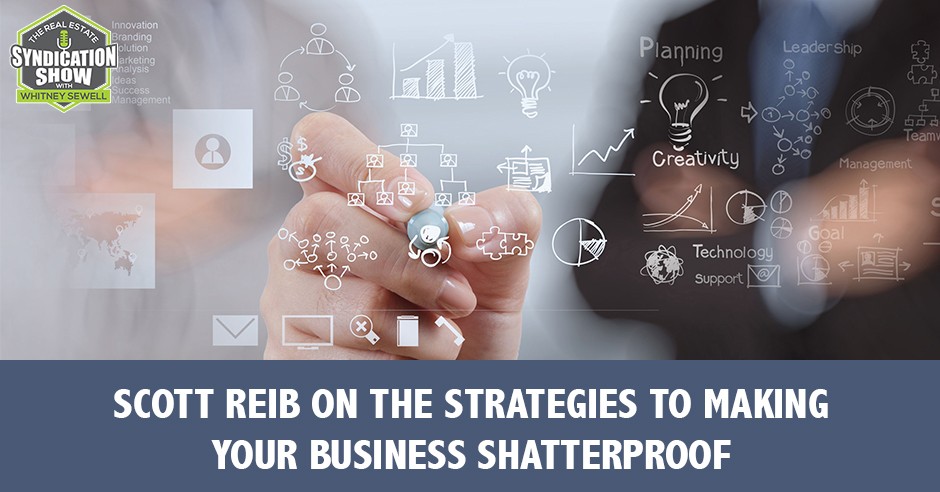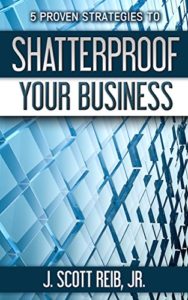
Listen to the podcast here:
How do you win in life and in real estate? Make your business shatterproof. Known as America’s Legal Coach, Scott Reib reveals how to scale your business by breaking down five proven strategies to shatterproof your business. With over twenty years of experience as an attorney helping business owners, entrepreneurs, coaches, and service providers to succeed in the professional world, he lists down who should be in your team of key advisers. As he points out some of the uncommon problems that may arise in business that we may be unaware, Scott uncovers his shatterproof business structures. On the side, find out his recommendation about investing through an LLC as opposed to your name, and more.
Our Gracious Sponsor:
Are you tired of answering emails from investors about when they’ll receive their K-1s?
Let The Real Estate CPA handle the accounting and taxes on your next syndication and they’ll file your tax returns by March 15th so you can get K-1s to your investors by the individual filing deadline on April 15th.
Not only will this reduce headaches, but it will help you retain investors over the long-term by improving investor experience.
The Real Estate CPA is now offering a Special Virtual Workshop to the listeners of The Real Estate Syndication Show on How to Answer Tax Related Questions from Your Investors!
Learn more today by visiting: http://bit.ly/Real_Estate_CPA
—
Watch the episode here:
Scott Reib on The Strategies To Making Your Business Shatterproof
Our guest is Scott Reib. Thanks for being on the show, Scott.
Thanks for having me, Whitney.
It’s a pleasure to have you on the show. We cannot have enough legal advice, that’s for sure. I’m looking forward to getting into this. Scott is known as America’s legal coach. He’s the official Zig Ziglar small business lawyer, a Legacy certified trainer and he has over twenty years of experience as an attorney. Scott has been helping business owners, entrepreneurs, coaches and service providers to shatterproof their businesses and succeed in the professional world. He’s a firm believer that seeking legal advice doesn’t have to be intimidating or expensive if we treat lawyers like primary care doctors instead of ER doctors. Through his subscription-based access plan at legal service, Scott is making great strides in shifting that perspective. Scott, thank you again for your time and expertise sharing with our audience. Give them a little more about just who you are, maybe where you’re located and what your focus is right now.
I’m located in Denton, Texas. We’re 35 miles north up I-35 from Dallas. I’ve lived in that town for about twenty years. I’ve been married 28 years to my beautiful wife. We have two boys: Jake who’s twenty and Luke is seventeen. They keep me busy. I also double as a varsity soccer coach for my seventeen-year-old’s school. I stay busy, but my primary focus other than family is to help entrepreneurs especially investors put deals together and make sure that they’re shatterproof.

I’d love to dig into that. Help us to think about how to structure our business so it’s shatterproof or maybe some common things. People were coming to you often like the ER doctor and we don’t want to do that. We don’t want to be in those shoes. Help us to think differently even about our relationship with an attorney like yourself and the doctor we’re going to on regular visits as opposed to when it’s too late most likely.
In my book, 5 Proven Strategies To Shatterproof Your Business, the first strategy is that you need to assemble what I call a team of key advisers. People could argue with me and come up with a couple more, but there are four you need to have. The first one is you need to have an accountant. I prefer a CPA, but there are some good accountants that aren’t CPAs that understand your business. They understand doing a real estate syndication deals, the structure, the taxation, the cashflow and all of that so that they can help you be successful. They can help you set up your books, they can set up the accounting software and they can teach you to use it. These are things that most people don’t know how to do when they start an investing company or career or if they’re shifting out of a 9 to 5 business or work job or W2 jobs and now this is totally new. If you had that one key adviser, you can make a big difference.
That’s going to be an accountant that you’re not just going to find on a whim either, but somebody like that can change your business drastically for the better. If they have that experience, they understand the structure and they understand cashflow. That’s going to be a key advisor for sure.
They can teach you how to refinance your statements that can help you evaluate the properties if they know what they’re doing. The reason I call it key relationships is because it’s not just finding one and then call him every April and give him your tax stuff. It’s having a continuing conversation with them as your business grows and as you encounter different things so that they’re keeping up with you. You’re making sure you have the best advice. The next thing to add onto that would be you want a banking relationship. It’s a banker and not a bank. There’s a bank on every corner. You need a banker that you have their cell phone number and they have your cell phone number. You can call them when you’re trying to put a deal together. Maybe you need to write a check to put down on a property and maybe you’re a little bit short. They can either offer you a line of credit or maybe you’ve got a deposit that will come in the next day and they’ll trust you because of that relationship to go ahead and let you write what would normally be a hot check. With that relationship, you can go a lot further.
The next thing that you need to have a relationship is an insurance advisor. You need someone that is an independent broker, but they don’t have to be. They can look at your business, whether it’s real estate or anything else and say, “Here are the different coverages you need for your business right now.” You may not be able to afford them all, but at least you know. G.I. Joe said, “Knowing is half the battle.” You know what you need and then you can check them off as you get more cashflow. If you have more ability to pay, you can make sure you have those coverages in place. Last but not least is that you need to have a legal relationship. You need to have an attorney that is working with you on your business. They need to help you set up the business so that you have the right structure or the foundation for your business. Then they just need to run with you as you’re making these decisions as to who to invest with and what vehicles to use. If they understand what you’re doing, that can be invaluable and make sure you don’t step into some big potholes along the way, which can be very costly.
That’s interesting when you talk about having that legal relationship and somebody that can help you, know where to invest, who to invest with possibly. Most of the time, people think about who’s going to help you with knowing where to invest while you think of financial advisor or somebody like that. As a syndicator, people say, “I’d like to have these documents so I can give it to our attorney. We welcome that because I’m going to value your opinion as well.” Then the investor is paying for that. Welcome the feedback.
[bctt tweet=”We don’t want anything at work or investments to come home and hurt us.” via=”no”]
A good analogy here is that with these four advisors, you don’t want to hire them when there’s a problem or a storm. If there’s a hurricane, you want to already have your plywood at your house so that you can put it on the windows. You don’t want to have to try to find plywood in the middle of a storm. They can’t jack up their price anymore allegedly, but it can be hard to find it. With a lawyer, especially if you get in trouble and you have to Google a lawyer, call your friends, who do I go see, make an appointment a week out if they’re any good. By that time, it may have gotten worse. Once you meet with them, they don’t instantly start to work. You have to retain them and pay them some money. That can take a long time and be a headache so do that now while you aren’t in trouble and while it’s no stress and nail down that relationship for any of those advisors so that you have that done.
On the legal side, I think you should have someone that has some pricing plan that makes it easy for you to use them so that you don’t have this fear of calling them. The traditional lawyer is always billed by the hour, which comes down to every six minutes. If you call them, then you’ll feel like money is flying out of your pocket. We changed that model about a few years ago to where our business clients can call us unlimited with any question they have. It doesn’t matter what it is and it doesn’t even have to be legal. It can just be a question. They don’t get charged for that. They can email us or text us. They have unlimited access to my team because we want them seeking that advice as they’re running with their business, not when they get in trouble. That’s more costly for everyone and it’s harder for me to deal with. I don’t want hard, I want easier. By doing that, it makes everyone’s life better and you have to work ahead of time to create that relationship. There are other lawyers that will have a similar type of ways to work or you could come up with a retainer relationship, but something where you have that nailed down now and not waiting for that problem to come.
What are some of the uncommon problems that we need to be aware of that we’re not going to be shatterproof?
The second strategy would be the structure. You need to make sure you have the right legal entity in place. We’re talking about syndication, we’re talking about limited liability companies, limited partnerships and now what’s popular would be the Series LLC. You can use any of those entities. They will all work. You need to understand them so you need someone that can teach you what they are, how they work and what the advantages and disadvantages to those different entities would be for your particular investment or business. Then you need to have it set up right. In this world where we can go online and find all these different portals that you can do your own legal documents, which is great but there is some danger there because you may not know how to answer the questions they’re asking you to fill out these online forms. If you answer it incorrectly or just different than they expect, you may get something in the form that shouldn’t be there. You should have that relationship.
You should get those done by someone that knows what they’re doing because there are some steps you need to follow to have a real legitimate entity. The purpose of it is to have separation from our personal lives, from our business or investment life. We don’t want anything at work or investments to come home and hurt us. By setting up the right entity the right way, then we ensure that doesn’t happen. If you skip some steps, you could leave yourself exposed so it’s important to make sure that you do that right. You need to follow this certificate formation and it needs to have the right language in it. Then you need to have an operating or company agreement for your LLC. You need to ratify that by either having a meeting with yourself or the other investors or doing a unanimous written consent to that so that there’s proof that you did form this LLC. You should do annual minutes of what happened with your company over that year and approve everything that was done by the members. It’s not required by most states, but it goes a long way if you end up in court and someone is trying to pierce your corporate veil and go after your personal assets.

You mentioned that there are ways to get these documents cheaper online and some of that. I understand that. I want the relationship with somebody like yourself. I don’t care if I’m paying a little more up front because unfortunately if that happened, I need representation and some real help. It’s time for the ER. I already want to know you. You need to be involved and if you’ve created those documents, I hope that you’ve got the bat for me, as opposed to calling you after I bought the cheap documents.
A lot of people are going too fast with this stuff and not putting together entities at all and using general partnerships to do this stuff, which is dangerous. I’ve had clients come in that they’ve got ten to twelve properties that they’re invested in and all their interests are owned in their personal name. Maybe someone put together entities for the actual investments, but they own those investments in their personal name so there’s no separation between them and the investment. Everything they have is exposed. If you end up with one bad lawsuit, everything that you have personally is tied up in it. I’ve had that happen with clients. You have to have a plan for your business.
If you’re going to be syndicator, then you need to have a plan for how you’re going to structure those deals. We created what I call shatterproof business structures. Every client has this custom diagram going in as they come into us. We create that for them so they can see, “Here are the companies I have now. Here’s what I would have as I grow in the future so that I can make sure that I’m protected. My personal assets are protected from my business. Each business asset is protected from the other asset.” I get a lot of investors who are doing multiple things. If real estate maybe is their side hustle, they may still have a W2 job. They wouldn’t want to do something with their W2 job or with another business that might create liability for these properties. You have to make sure you’ve kept everything in separate baskets and then you have agreements between them. None of this is rocket science. It’s just that you need someone to help you design it, stay on top of it and maintain it.
That’s why we need somebody like yourself. You mentioned having LLC and having these things structured and speaking with someone like yourself way ahead of time just to have an outlook of what we’re growing into. Even from a passive investor’s standpoint, would you recommend investing through an LLC as opposed to our own name? I’m not saying syndication specifically or as opposed to using your own name.
The name of the asset protection game is to own nothing in your name. You’d want to have at least one piece of some entity between you and into your investing in my opinion. A lot of people do it but you’re leaving yourself exposed. You should have a vehicle that you use to invest in real estate investments. If you’re doing other kinds of investments, I would have a separate LLC that does that. I wouldn’t invest in different classes of things from the same LLC. If you have the kind of coverage that my clients have, all they have to pay is the state filing fee to set up an LLC. If you’re using the Series LLC for these things, it costs nothing after you set up the first one. In most states, it’s about $50 to file that you’ve created a new subseries. That makes it simple. There’s not a real reason anymore not to have that entity to own whatever you’re doing.
[bctt tweet=”The name of the asset protection game is to own nothing in your name. ” via=”no”]
Why would we do a series as opposed to not doing series?
The series gives you some real advantages for speed and efficiency. We set up the master of the Series LLC, which is the umbrella entity. It owns these series that we can just pop up by drafting documents giving them a name. We now have this LLC. The subseries can be owned by different people. It doesn’t have to be the same ownership. Each subseries is completely separate from the other. The liability doesn’t go back and forth. There’s no taxation back and forth. Everything is completely separate. It gives you these silos of protection without having to file. In Texas, it’s $338 to create a new LLC, which isn’t expensive but that’s a pain if you’re doing a lot of deals. With the series, you don’t have to do that. You can just keep creating them and most of your deals will be the same in the same class of assets so it’s not that difficult to even create them if all you’re using them to do is buying into someone else’s deal. That’s simple.
If we’re creating a deal for you to syndicate, that’s a little more custom but it could still be one of the sells in that Series LLC. You just save a lot of money in the long run on filing fees and you would just have it looking on a diagram. You’d have that master at the top and then you just have all these ladders of LLCs down the bottom and then it’s easy to do the books. It’s easy for your account to keep track of. Everything is easy. It’s just a new vehicle. When I say new, it’s starting to get more popular. In the last couple of years, I’ve got comfortable with it. It used to be primarily used for oil and gas. It’s becoming a lot more general use for it and not just oil and gas or real estate.
You mentioned the team of key advisors, the structure and there’s more.
The third one would be to document everything. If you’re in real estate, you cannot do a real estate deal on a handshake. It’s not enforceable. The statute of frauds says which deals have to be in writing. In the real estate deal, you have to be in writing to be enforceable. You can’t lock down a piece of land by shaking the farmer’s hand. You’ve got to have a written agreement. That’s another place that a legal adviser comes into play. If you’re business-savvy, you can put together an enforceable agreement to lock someone in fairly simple. That’s not that hard. There are a few things. You want to make sure that you’ve got all the dates in it when you want it to perform, you have all the money right in it, you have the property description correct in a real estate contract. There are some things that you can do to lock it down. That’s where I see people not doing any of this. They’ll meet with someone, they may shake hands and they think they’ve got a deal. They don’t take that extra step fast enough to lock that into a contract before they start trying to ground up investors and then someone else comes in with a better offer and you’ve lost a deal.

That’s also where we’ll be communicating with someone like yourself to have those documents ready and make sure they’re well if they need to be.
In real estate, you want to add that fifth advisor. Unless you are a real estate agent or broker, it will be a good idea to have a strong relationship with someone in that business that can be your go-to person birddogging deals for you for one thing. Also, they can put together those contracts very fast, especially if they know how your business runs. If you have this team approach, then your lawyer has already reviewed the form that they use so you have it all ready. You have to know who you’re going to do so you have to plan and prepare. Once you’ve done that, it makes it easy to win in life and in real estate.
We’re going to document everything. There were five things. Is that correct?
There are five things. The fourth one would be to make sure that you protect your intellectual property. If you’re creating a brand like you’ve created for yourself with Life Bridge, then you want to trademark that name. You have an automatic trademark. It’s called a common law trademark when you use something to stand for your business and consider your mark. That is yours and you could stop someone else from using it. Without registry in it, you couldn’t recruit damages. Let’s say people started investing with them because they thought it was you and they made a bunch of money off that. That’s the money you should’ve made because that was the brand that built. If you register it, you can recoup that plus the attorney’s fees. The other thing that you want to make sure you’re doing is if you’re creating content like your podcast, you want to make sure that your copywriting those. You want to use copyright notices on your videos and you want to use them on your websites. If you have something that you need, maybe you created a real estate course or some video course, then you want to register that with the copyright office. It’s $75 to register it with the copyright office, to have that nailed down, “This is mine. You can’t take my content and reuse it without paying me.” That’s the fourth step. Make sure you’re protecting your intellectual property.
The fifth strategy is also about intellectual property, but it’s the flip side. Don’t use someone else’s. A lot of entrepreneurs are throwing up websites for their new companies. They’ve had the Gerber entrepreneurial seizure, so they go online. There are some easy ways to create websites real fast. You don’t have to have any talent anymore to do a quick website. Where do you get images? You go to Google and they’re all over the place. They must be free. They’re on Google. They’re not. Most of those have copyrights on them and aren’t royalty-free. What happens is you put them up on your website and then there are people that have software that’s trolling the web looking for their client’s copyrighted images. They can identify them and then they’ll send you a demand letter and you’re on the hook for some big statutory penalties. There’s no oops defense. It doesn’t matter that you didn’t know. You’re going to pay them. It’s just a matter of how little you can get by with. Sometimes you can negotiate that down but if not, they’re going to sue you in federal court and you’re going to lose.
[bctt tweet=”You cannot do a real estate deal on a handshake. It’s not enforceable. ” via=”no”]
Even if your webmaster uses the images that aren’t right, you’re still going to be on the hook for it and they won’t. You want to make sure that anyone’s intellectual property that you’re using, you have the permission to use it. You want to make sure when you do brand name in your investment company or if you’re selling real estate, your real estate sales company, that is something that someone else hasn’t already used. You wouldn’t want to build your brand on someone else’s and find out years later that you’ve infringed on their mark and then have to start all over and possibly pay them some damages.
I’ve heard a very few times anybody talk about those “free photos.” I’m glad you brought that up. When you’re in the moment and you’re trying to build that website, you fix and go to that networking conference. I hear it all the time, “We’ve got to get that website up fast.” Where are you’re going to find those photos? You don’t normally just think of something like a photo that you’re getting off of Google as being something you’re stealing from somebody else.
They’ve put some time and talent into that so they deserve to be paid something for it and there are some reasonable sites out there where you can buy them and there are some sites that are royalty-free. You have to be careful and know what you’re doing. If someone else is doing it for you, make them prove to you that they have permission for those images. It’s an overlooked step. It happened to my clients. They’ve come in and that’s been how we’ve ended up representing them. Their problem is they get this demand letter that scares them to death.
I’m glad that they were working with you at that point. Do you have maybe one thing that we wouldn’t normally think of that could get us into trouble that we should be you watching out for as far as in the syndication business or anything from websites that your clients have dealt with?
In syndication business, one thing to look out for is you’re partnering with other people. If they are investing in the name of entities, you want to make sure that you do your homework and look for what I would call the birth certificate for that entity. It’s the certificate or formation or articles of incorporation and you can pull those off of the state websites. It might be $1 or less to get a copy of that and make sure that they’re in good standing to do the deal because they might not be. You want to make sure that everyone is part of your deal and everyone is in good standing. That’s the trick. It may just have been that they forgot to file some report and something happened to where they lost their status of good standing. It can be fixed quickly, but if you’re putting a deal together, you want to make sure that everyone that’s doing that has the right standing so that your deal is legitimate.

Scott, what’s the number one thing that’s contributed to your success?
Systems have been the key.
Is there one specific system or something that’s helped you with systems that we could all use?
Don’t do things twice. If you figure out in your business that you need a system, then as you’re doing it, create the system. It’s easy to do now. You can type out the steps into a Google sheet and now you’ve got the ten steps on how to do a podcast interview. You have the checklist and then you can take that and go. If there are certain things you do on your computer, you can do a screenshot of your video. Walk yourself through it, then the next person that has to do that can watch your video, look at your checklist and do it. It takes you maybe five or ten minutes longer than it would have to just do it and next time, you can delegate that to someone else because you’ve got it created.
If you don’t do that, if you keep doing it over and over again, then it gets very frustrating because you can’t ever get anyone to help you because you haven’t taken the time to explain what you need. If you’ve explained it right and created the system, then you can hire a virtual assistant. All you have to do is share the Google Document with them and it’s got this system or doing whatever tasks you want. That’s been key for me as we’ve tried to scale our business. Have systems that new teammates can follow without having to be highly skilled. It’s not that we don’t want good talent here, but I don’t want my business to be talent-dependent. I want it to be system-dependent.
It doesn’t require as much of your time than either training.
If you do it as you go, it takes a lot less time than having to go back and do big chunks of checklists and videos. Build the business and build the systems as you go. It’s much easier earlier in your business because you’re not going to be quite as busy. If you get 100 units under your belt, you’re going to be busy trying to keep up with those and you might not have time to create the systems that you need for an executive assistant to start using it. Do it as you go and then when you grow, you’ll be ready and you’ll be so thankful you did it.
That’s how I get all this done for the podcast exactly. I’ve created a video of my screen and talking to exactly what I’m doing and then I can let any VA anywhere in the world watch it so they know how to do it. It’s awesome. How do you like to give back, Scott?
We give back with various ways. I’m very involved in church and then we also pick from time to time a different nonprofit that we will donate some proceeds to.
Scott, you’ve been a fantastic guest and I appreciate your time and sharing your expertise and just helping us understand the relationship with somebody like yourself and not waiting until it’s the last minute. Whether it’s developing that team of advisers, the structure, documenting everything, protecting our property and not using someone else’s property. I appreciate how you elaborated on that. Tell the audience how they can learn more about you and your company.
You can go to ReibLaw.com/syndication and it will come to a show page just for your show audience. We have some special offers on them. There’s a free white paper for them. They can get the book we just had been going through more information on our access plans. I have a business law master class that they can get access to on a reasonable basis to learn some of the business law skills that you need to run an investment business. You can always find me on @TheScottReib on Instagram.
I didn’t even know you’re doing all that. That’s incredible. I appreciate you offering that to the audience and the value you’ve created. I appreciate the audience being with us. I hope you’ll go to Life Bridge Capital and connect with me and join us on the Facebook group, The Real Estate Syndication Show. We will talk to each of you next time.
Important Links:
- Scott Reib
- 5 Proven Strategies To Shatterproof Your Business
- ReibLaw.com/syndication
- @TheScottReib on Instagram
- The Real Estate Syndication Show on Facebook
About Scott Reib
 Scott Reib (pronounced “Reeb”) is known as America’s Legal Coach. He’s the official Zig Ziglar Small Business Lawyer, a Ziglar Legacy Certified Trainer, and he has over 20 years of experience as an attorney. For the last two decades, Scott has been helping business owners, entrepreneurs, coaches, and service providers to “shatterproof” their businesses and succeed in the professional world.
Scott Reib (pronounced “Reeb”) is known as America’s Legal Coach. He’s the official Zig Ziglar Small Business Lawyer, a Ziglar Legacy Certified Trainer, and he has over 20 years of experience as an attorney. For the last two decades, Scott has been helping business owners, entrepreneurs, coaches, and service providers to “shatterproof” their businesses and succeed in the professional world.
Scott is a firm believer that seeking legal advice doesn’t have to be intimidating or expensive if we treat lawyers like primary care doctors instead of ER doctors. Through his subscription-based Access Plan legal service, Scott is making great strides in shifting that perspective.
Love the show? Subscribe, rate, review, and share!
Join the Real Estate Syndication Show Community:



